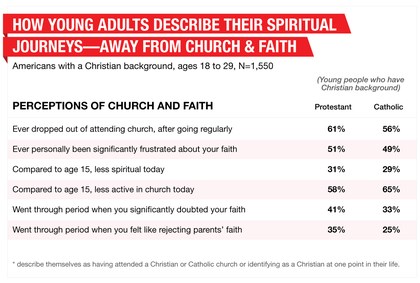The increasing number of young church dropouts isn't just a Protestant problem. According to new research from the Barna Group, "65 percent of Catholic-raised young adults say they are less religiously active today than they were at age 15."
Of the 1,550 people surveyed (all of whom were Catholics and Protestants who were raised in church or reported identifying as Christian at some point), Catholics reported lower levels of church-faith tension than Protestants in every category except one: 65 percent of Catholics said they are less involved in church now than they were before, compared to only 59 percent of Protestants (full infographic below).
For a Catholic church in transition, that's a key statistic. Barna president Dave Kinnaman says millennial church dropouts need to become "a high priority among Catholic church leaders... Being effective among Millennials requires understanding what makes them tick, which includes knowing how the church's teachings and positions on key social issues affects and is interpreted by young Catholics."
The data is part of Barna's larger study of young Catholics, which includes their views of controversial issues such as birth control and religious liberty.
Nearly equal numbers of Protestants and Catholics said they have been "significantly frustrated" by their faith (51% vs. 49%, respectively) and that they are less spiritual now than at age 15 (31% vs. 29%).
But Protestants were more likely than Catholics to say they dropped out of attending church (61% vs. 56%), doubted their faith (41% vs. 33%), and considered rejecting their parents' faith (35% vs. 25%).
CT previously has reported on Catholicism, as well as on the united efforts of Catholics and Evangelicals together. CT also has reported on prodigal children, who have their own spiritual lives and are free to doubt their spiritual upbringings.

Support Our Work
Subscribe to CT for less than $4.25/month



















